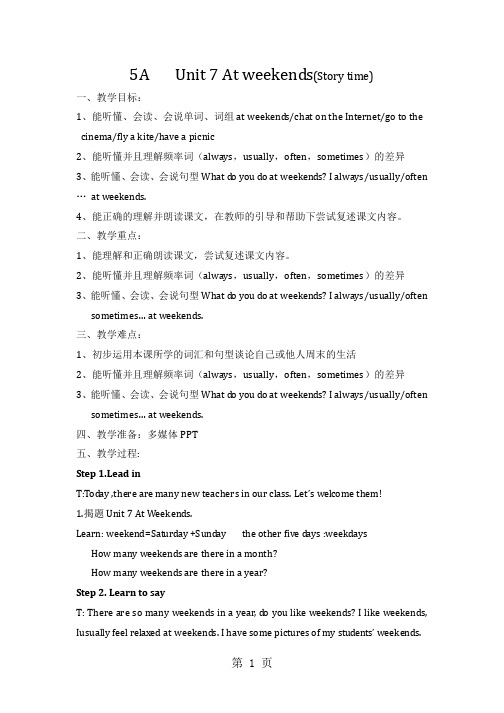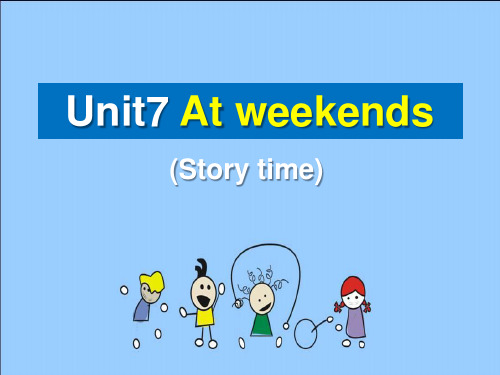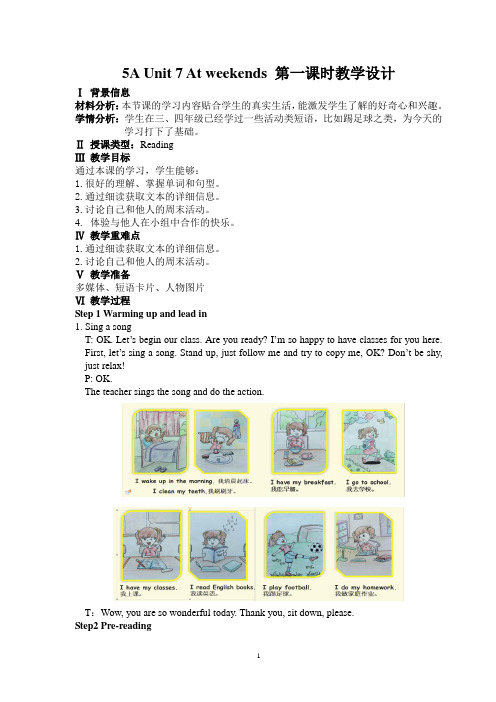【精选】五年级英语上册unit7atweekends第1课时storytime同步练习牛津译林版
- 格式:doc
- 大小:42.00 KB
- 文档页数:4

五年级上册英语教案-Unit 7 At weekends 课时1 ( Story time)译林三起教学目标1. 让学生理解并能运用一般现在时描述周末的活动。
2. 培养学生听说能力,提高阅读理解能力。
3. 培养学生合作学习的能力,通过小组讨论分享个人的周末活动。
教学内容1. 词汇:weekend, often, sometimes, visit, pool, park, museum, cinema, shop2. 句型:- What do you often do on weekends? - I often ...3. 故事阅读:Unit 7 Story time教学重点与难点1. 教学重点:正确运用一般现在时描述周末活动。
2. 教学难点:词汇的记忆与运用,理解故事内容。
教具与学具准备1. 教具:PPT,教学录音,黑板,粉笔2. 学具:英语课本,笔记本,彩色笔教学过程1. 导入:通过PPT展示一些周末活动的图片,引导学生思考并分享他们的周末活动。
2. 新授:讲解并练习新的词汇和句型,让学生在小组内进行对话练习。
3. 故事阅读:阅读Unit 7 Story time,引导学生理解故事内容,并回答相关问题。
4. 巩固练习:通过角色扮演,让学生运用所学知识进行对话练习。
5. 总结:总结本节课所学内容,强调重点与难点。
板书设计1. Unit 7 At weekends2. 词汇列表:weekend, often, sometimes, visit, pool, park, museum, cinema, shop3. 句型:- What do you often do on weekends? - I often ...作业设计1.抄写并默写新学的词汇。
2.完成Unit 7 Story time的阅读理解练习。
3.用英语写一篇小短文,描述自己的周末活动。
课后反思本节课通过图片导入,激发学生的学习兴趣。

5A Unit 7 At weekends(Story time)一、教学目标:1、能听懂、会读、会说单词、词组at weekends/chat on the Internet/go to the cinema/fly a kite/have a picnic2、能听懂并且理解频率词(always,usually,often,sometimes)的差异3、能听懂、会读、会说句型What d o you d o at weekends? I always/usually/often …at weekends.4、能正确的理解并朗读课文,在教师的引导和帮助下尝试复述课文内容。
二、教学重点:1、能理解和正确朗读课文,尝试复述课文内容。
2、能听懂并且理解频率词(always,usually,often,sometimes)的差异3、能听懂、会读、会说句型What d o you d o at weekends? I always/usually/oftensometimes… at weekends.三、教学难点:1、初步运用本课所学的词汇和句型谈论自己或他人周末的生活2、能听懂并且理解频率词(always,usually,often,sometimes)的差异3、能听懂、会读、会说句型What d o you d o at weekends? I always/usually/oftensometimes… at weekends.四、教学准备:多媒体PPT五、教学过程:Step 1.Lead inT:Today ,there are many new teachers in our class. Let’s welcome them!1.揭题Unit 7 At Weekends.Learn: weekend=Saturday +Sunday the other five days :weekdays How many weekends are there in a month?How many weekends are there in a year?Step 2. Learn to sayT: There are so many weekends in a year, d o you like weekends? I like weekends, Iusually feel relaxed at weekends. I have some pictures of my stud ents’ weekends.1.Show the pictures of my stud ents’ weekends, speak out what they do then ask and answer:What d o they d o at weekends?They usually…2.T: Do you know my weekends? Can you guess? Look at the pictures.a. Show them one by one, present “play with my d og”“visit my parents” “go to the cinema” “chat on the Internet”chat on the WeChat /QQb. T: What d o I d o at weekends?S: You…c..师小结, But how often? Listen! I always… I usually … I often… I sometimes…(师随即板书频率副词)d. Present the learning tips of the adverbs of frequency.3. Let’s talk : What do you d o at weekends? I… (要求学生至少使用两个频率副词) Step 3. Learn Story timeT: Let’s see our ol d friends Su Hai ,Mike and Helen, what d o they d o at weekends?a. Listen and circl e what Su Hai d oes at weekends ?”b. Listen and tick “ what d o Mike and Helen d o at weekends?”Way: 学生回答的同时教师随机在黑板上贴上活动图片。

《Unit 7 At weekends》Story time教案Teaching Contents:Story timeTeaching aims and demands:Knowledge goals:By the end of the lesson, the students should be able to•talk about adverbs of frequency: always, usually, often and sometimes.•master the new words and phrases.•know the story and read the story.•Enable students to know how to ask the questions: who, where, what…Ability goalsBy the end of this lesson, the students should be able to•talk about their weekends with the target language.•improve their listening and speaking skills.Moral goalsBy the end of this lesson, the weekends of the students should be colorful .Teaching focus:1. To get the main idea of the whole passage with different tasks.2. To retell the whole passage.Predicted area of teaching difficulty1. Use always, usually, often and sometimes to talk about frequency.2. Get the students to try to use some reading strategies to retell the text.Teaching aids: CAI, cardsTeaching StepsStep1 Warming-up1.GreetingsT: Hello, everyone. I'm your new teacher today. You can call me Miss Cao. Nice to meet you. Ss: Nice to meet you, too.2.Happy time: Ss say the activities.T: First,let’s have a happy time.When you see the pictures,please stand up and say them loudly.Step2 Pre-reading1.Lead inT: So you have a lot of activities on Saturdays and Sundays.Saturdays and Sundays, we call them weekends.Teach: at weekendsToday we will learn Unit 7 At weekendsT:Do you come to school at weekends?Ss: No, I don’t.T:What do you usually do at weekends?Ss:I…T: Are you happy at weekends?Ss: Yes.2.Look and learn1.)T: Me, too. what does Miss Cao usually do at weekends?I have an e-friend,I usually chat on the Internet.Teach: chat on the Internet2.)T:Sometimes I go to the park.Teach:sometimesStep3 While-reading1.T:All right.We just talked about our weekends.Do you want to know other’s weekends?Ss: Yes!T: Please watch the cartoon carefully and tell me the name.Ss: ...T : Right. They are the twins Su Hai and Su Yang,Mike and his sister, Helen.2. T: So, what do they do at weekends? Let’s get to know Su Hai and Su Yang’sweekends first.Listen and circle.Teach:visit grandparents ,often.3. T: What about Mike’s weekends?4. T: What does Helen do at weekends?Watch and answer.Teach: go to the cinema,always.5.Learn by yourselves.1.)Circle the key people.2.)Underline the phrases.6.T:Helen always has dancing lessons. So ‘always’ can get 5 stars.T:Mike usually plays football at weekends.T: How many stars for ‘usually’?S s: 4T:What about ‘often’? How many stars for ‘sometimes’?Step4 Post-reading1.Listen and repeat.T: Now, let’s read the text after the record.2. Let’s read.T: And this time, please choose a way to read.3. T: Good job! Now open your books and turn to Page 70.L et’s finish this part. T:Look and write.4. Enjoy the American’s children’s weekends.Step5 Homework1.Read ‘Story time’ three times.2. Try to report your weekends after class.。

五年级上册英语说课稿-Unit 7 At weekends 第一课时Storytime1.教学目标1.学生能够识别、理解并说出下列单词:Saturday, Sunday, weekend, story, read。
2.能够听懂、理解并回答有关周末活动的问题。
3.通过训练,学会口头表达自己的周末活动,提高口语表达能力。
4.加深对英语学习的兴趣,培养良好的英语学习态度。
2.教学重难点重点:掌握本节课中出现的单词。
难点:理解周末活动并表达。
3.教学准备教具:教学PPT,课件,图片等。
4.教学过程1.启发思考老师先通过图片或视频让学生了解有关周末活动的信息,并引导学生思考周末活动有哪些。
2.听说训练老师通过展示单词图片,让学生跟读,并鼓励学生加强区分某些相似单词的不同。
然后老师会让学生听一段英语故事,然后回答关于周末活动的问题。
学生将锻炼听力和口头表达能力。
接下来,老师会把学生分成小组让他们彼此介绍自己的周末活动并且帮助他们练习口语表达,让学生充分理解并掌握单词的正确用法。
3.口语练习学生通过角色扮演或者对话的方式练习自己的口语表达,例如:两个同学在用周六和周日计划别致的周末时,可用以下形式:A:What are you going to do this weekend? B:I’m going to visit my grandparents. A:That sounds great. Where do they live? B:They live inthe countryside. A:Wow, that should be very enjoyable.4.课堂小结总结本节课主要内容,并梳理学生已经学会的重要词汇以及所学取之不尽的话题,培养学生对英语学习的兴趣和热情。
5.课后作业1.复习本节课所学的单词,并能正确拼写出来。
2.重复并表述所学的英语句型。
3.每周末通过英语口语介绍自己的活动,并成功运用所学单词。


5A Unit 7 At weekends 第一课时教学设计Ⅰ背景信息材料分析:本节课的学习内容贴合学生的真实生活,能激发学生了解的好奇心和兴趣。
学情分析:学生在三、四年级已经学过一些活动类短语,比如踢足球之类,为今天的学习打下了基础。
Ⅱ授课类型:ReadingⅢ教学目标通过本课的学习,学生能够:1.很好的理解、掌握单词和句型。
2.通过细读获取文本的详细信息。
3.讨论自己和他人的周末活动。
4.体验与他人在小组中合作的快乐。
Ⅳ教学重难点1.通过细读获取文本的详细信息。
2.讨论自己和他人的周末活动。
Ⅴ教学准备多媒体、短语卡片、人物图片Ⅵ教学过程Step 1 Warming up and lead in1. Sing a songT: OK. Let’s begin our class. Are you ready? I’m so happy to have classes for you here. First, let’s sing a song. Stand up, just follow me and try to copy me, OK? Don’t be shy, just relax!P: OK.The teacher sings the song and do the action.T:Wow, you are so wonderful today. Thank you, sit down, please.Step2 Pre-reading1. Elicit the topicT: Well, I know you go to school from Monday to Friday, yes, but do you go to school on Saturdays and Sundays?P: No.T: Yes, me too. Do you know, Saturday and Sunday, we can call them, weekend. And look! I can divide this word into two words——this is “week”and this is “end”.What does the end mean? Do a choice, please. A or B?P: A.T: Yes, bingo,you are right,so weekend is the end of a week. Pay attention: ds, we pronounce: “z”, follow me, z, z, weekends, weekends, and this is our topic today: at weekends,at weekends.2. Clear the goals of this lessonT: OK. Look! This class we will talk about my weekends,four kids’ weekends. Four kids, who are they? Don’t worry, we’ll meet them later. And we’ll talk about your weekends. Are you clear?P: Yes.3. Talk about the teacher’s weekends.T: Oh, look, who is she?P: Miss Yang.T: Yes, it’s me! My English name is Joy, so you can call me Joy. Now I will introduce my weekends to you. Listen carefully. I always read books at weekends. I usually watch TV at home. I often go to the cinema with my friends. And I sometimes chat on the Internet at weekends. OK. Look at these four words. Follow me. Always means…P: 总是…4. Different the four words: always, sometimes, often, usuallyT: OK. I put the four words here. Look, I have some stars, if I give “always” five stars,how many stars do you want to give for “usually”? You please.P: Four stars.T: Thank you. You are right. How about “often” ? Have a try.T: Thank you. Do you agree?P: Yes.T: Very good! “Sometimes”? How many stars? Give you a chance, please.P: Two stars.T: Boys and girls, do you agree with her? Good job!5. Play a game to checkT: OK. Boys and girls, you know my weekends, but do you know my weekends well? Let’s check. Look! Rules: If the sentence is true, you say “Yeah! Yeah! Yeah!”, if the sentence is false, you say “No! No! No!”, OK?P: OK!…T: Great! Joy often goes to the cinema at weekends. What does the “cinema” mean?P: 电影院。
【精品】Unit7 At weekends Story time(教案)译林版(三起)-五年级英语上册【教学目标】1.知识目标:(1)能掌握四会单词: visit, often, always, sometimes, there.(2)能掌握三会单词和词组:grandparent, chat, Internet, at weekends, play with, very much, go to the cinema.(3)能掌握四会句型: What do you do at weekends? I always/usually/ often/ sometimes ... (4)能正确理解、朗读和表演课文内容。
2.能力目标:能够在情境中运用四会句型:What do you do at weekends? I always/usually/ often/ sometimes ...进行交际对话。
3.情感目标:引导学生相互交流周末计划并养成合理安排周末时间的好习惯。
【教学重点】1.能掌握四会单词: visit, often, always, sometimes, there.2.能掌握三会单词和词组: :grandparent, chat, Internet, at weekends, play with,very much, go to the cinema.3.能掌握四会句型: What do you do at weekends? I always/usually/ often/ sometimes ... 【教学难点】能理解故事大意,较流利的朗读并试着表演Story time课文内容。
【教学方法】1.任务型教学法:学生在完成任务的过程中,提高了综合语言运用能力。
2.光盘录音辅助教学法:设计新颖,化解了教学难点,提高了学生学习积极性。
【教具准备】CD、图片、卡片【教学过程】Step1.Warm-up1.Greetings.2.Enjoy some pictures欣赏一些有关动词词组的图片,激发学生的学习兴趣,自然引出本课新授内容。
Unit 7 At weekends.
第一课时Story Time习题
一、用所给词的适当形式填空:
1.I usually _____ (visit) my grandparents.
2. I like _______(play) with their cat Kitty very much.
3. She always _______ (have) dancing lessons.
4.She sometimes _____(go)to the cinema with her friends.
5. What about _______?(you)
二.选择。
()1. What do you do ____ weekends?
A. to
B. in
C. at
()2. I usually _______ my grandparents.
A. visit
B. visiting
C. visits
()3. My grandparents live ____ the UK.
A. on
B. in
C.at
()4. She always _____ dancing lessons.
A. has
B. have
C. having
()5. I usually chat withthem _______ the Internet at weekends.
A. to
B. on
C. at
三.翻译汉语。
1. chat on the Internet__________________
2. fly a kite ____________
四、连词成句。
1. What do you at do weekends
______ _______ _____ ______ _______ _______ ?
2. My live the UK grandparents in
_____ _______ _______ _______ ______ ______.
3. She has lessons dancing always
_____ _______ _______ ______ ______ .
4. I the sometimes go to with my family park
_____ _______ _______ _______ _____ ____ _____ ______ _____.
5. She cinema sometimes to the with her friends goes ____ _____ _____ ______ _____ _____ _____ _____ _______. 五.根据汉语补全句子。
1.我通常看望我的祖父母。
I usually_____ my ________.
2.我们经常在周末和我们的祖父母吃晚餐。
We often_____ ______ with our grandparents _____ ______.
3.我通常在周末在网上和他们聊天。
I usually _____ _____ them _____ the _______ at weekends.
4.海伦在周末干什么?
______ ______ Helen ______ at weekends?
5.我通常在周末和刘涛踢足球。
I usually _____ ______ ______ Liu Tao at weekends.
Unit 7 At weekends.
第一课时Story Time习题
参考答案
一、用所给词的适当形式填空:
【解析】
1. 答案visit ususlly是频率副词,I是第一人称单数,所以动词要用原形。
2. 答案 play like后面加上动名词。
3. 答案 has ususlly是频率副词,本句为一般现在时,因为she 是第三人称单数,所以要用has。
4. 答案 goes sometimes是频率副词,本句为一般现在时,因为she 是第三人称单数,所以要用goes。
5.答案 you about是介词,后加宾格形式。
you的宾格还是you。
二.选择。
1.答案:C at weekends在周末。
2.答案:A usually是频率副词,本句为一般现在时,因为I 是第一人称单数,所以要用visit。
3.答案:B live in居住在
4.答案: A always是频率副词,本句为一般现在时,因为she 是第三人称单数,所以要用has。
5.答案:B chat on the Internet是固定短语。
三.翻译汉语。
1. 答案:在网上聊天
2. 答案:放风筝
四、连词成句。
1. What do you do at weekends?
2. My grandparents live in the UK.
3. She always has dancing lessons.
4. Isometimes go to the park with my family.
5. She sometimes goesto the cinema with her friends. 五.根据汉语补全句子。
1. visit grandparents
2.have dinner at weekends
3.chat with on Internet
4. What does do
5. play football with。